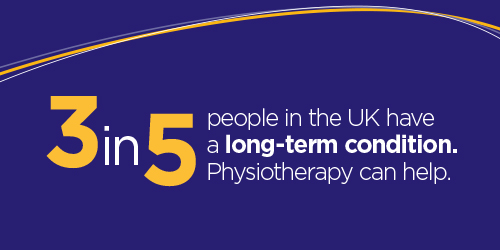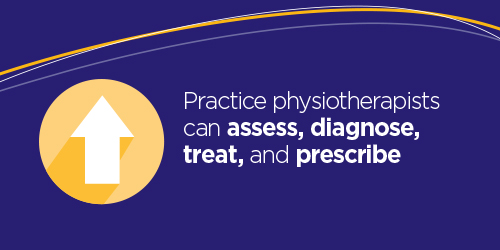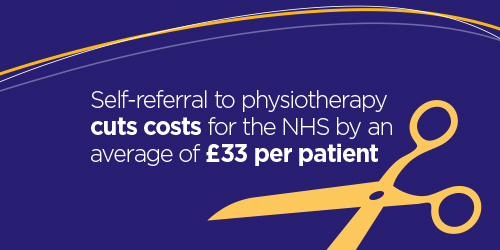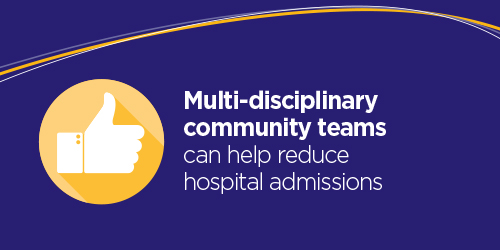With the population getting older and more people living with long-term conditions, the health and care system needs remodelling to meet patient needs, increase efficiency and improve health outcomes. This Parliamentary Briefing explores how the NHS could be remodelled to meet 21st century needs.

We want to work with MPs to improve health and care. Please contact Rachel Newton for more.
With the population getting older and more people living with long-term conditions, the health and care system needs remodelling to increase efficiency, improve outcomes and meet patient needs.
In practice this means integrating community services around the four Rs below, making full use of the expertise of all health and care professionals.
Resilience, reversal, results and responsiveness are the hallmarks of physiotherapy and what it delivers for individuals and communities.
- Resilience: reducing high health and social care needs by building people’s capacity to manage their own health
- Reversal: enabling people to make a complete recovery or regain maximum levels of mobility, function and independence following accident or illness
- Results: focussing on outcomes tailored to meet individuals’ personal goals
- Responsiveness: responding to an individual’s circumstances as they change, to prevent crises and responding rapidly when they occur
What can MPs do to help?
There is broad agreement from political parties, NHS providers and health professionals that changes are needed to meet population needs in the 21st century.
MPs have a powerful role to play. Here are steps you can take for your constituents:
- Support to a diversified primary care workforce, making full use of available clinical expertise
- Champion new models of primary care that use experienced physiotherapists alongside GPs
- Help make the case for physiotherapy workforce planning. There is a growing need for more physiotherapists yet numbers are failing to keep up
- Work with the CSP to make self-referral the normal route of access to physiotherapy in all communities
- Make sure your area has a falls prevention plan. Look up the CSP Falls Model to see how many falls could be prevented in your area
Primary care: models for the future

Primary care is the part of the NHS most-used by patients. But primary care faces enormous pressure, made worse through the shortage of GPs.
Training more GPs is only part of the solution: a diversification of the primary care workforce and a multi-disciplinary approach that integrates services and makes full use of the expertise of all health and care professionals.
Are you a CSP member? Please tell us how we can improve these briefings. Just login and complete our pop-up survey
Here are a few ways we can put physiotherapists’ talents to use.
Primary care: first contact physiotherapists
Practice physiotherapist roles are starting to be developed within primary care to work alongside GPs as a first point of contact.
Physiotherapists in these roles have the training and skills to safely and autonomously assess, diagnose, treat, prescribe medicines and manage patient needs.
As well as costing less than doctors, physiotherapists in these roles reduce costs of unnecessary prescriptions, referrals to consultants, x-rays and scans.
This new model of care has the potential to address the immediate crisis in general practice.
Most importantly, this can help deliver a better GP service as part of a modern primary care system.
Physiotherapists: falls prevention experts
Falls prevention savings
Every £1 spent on physiotherapy produces a £1.50 return on investment
Falls have a devastating impact on the lives of older people. If everyone aged 65 or older at risk of falling was referred to physiotherapy, 225,300 falls and A&E visits would be prevented. This can save the NHS £331 million every year.
Physical activity experts
Inactivity causes one in six deaths2 and is the precursor to many serious health problems.
Often people with long-term conditions develop other health problems because they do not feel able or confident to be more mobile and active.
Three in five people in the UK have a long-term condition. The number of people with multiple long-term conditions is expected to rise from 1.9 million in 2008 to 2.9 million by 20183.
The physiotherapy workforce are exercise specialists with expertise in movement science, analysis and function, giving people confidence to become physically active and return to work and independent lives.
Self-referral

Patient self referral, which allows patients to refer themselves directly to physiotherapists, has clinical and financial benefits and has been recommended by the National Institute for Care and Health Excellence (NICE).
Patients can self-refer for a musculoskeletal condition, such as back pain, in most places in Scotland and two thirds of Wales, and just a third of England.
Self-referral to physiotherapy achieves the following outcomes:
- Frees up GP capacity. Musculoskeletal conditions alone account for more than 100 million GP appointments each year, and many are repeat appointments
- Cuts costs for MSK problems by an average of £33 per patient. Further savings come from a reduction in prescribing rates
- Improves health outcomes. Self-referral helps prevent acute problems becoming chronic, and reduces long-term pain and disability
- Puts patients in control. Self-referral enables individuals to manage their condition and live independently, reducing missed appointments and improving adherence to treatment
- Cuts waiting times. In Torbay, North Devon self-referral cut waiting times from 10 weeks to within 3 days for 90% of patients4.
Physiotherapy keeps people fit for work
The most common type of work-related illness in the UK is musculoskeletal conditions (MSK), accounting for 8.3 million working days lost in 2013/14.
The second biggest cause is stress, and the two are commonly interrelated5.
The good news is evidence suggests that both are responsive to early, effective intervention. Rapid access to physiotherapy reduces the time employees have to take off work6.
Figures show that in 2013/14 28.2 million working days were lost due to work-related illness or injury with 8.3 million working days lost due to MSK. The average working days lost for each case of MSK was 16 days7.
Rehabilitation and prevention

Enabling easy access to multi-disciplinary teams in the community can reduce the revolving door of hospital admissions for older people and those with long-term conditions.
The award-winning Hope Street specialist service at the North East Lincolnshire Care Trust set up a one-stop falls prevention and respiratory rehabilitation programme run by multi-disciplinary teams involving patients and trained volunteer ‘rehab buddies’ as key partners.
Over four years, the programme has seen an 8 per cent reduction in visits to A&E and 13 per cent reduction in hospital admissions for people who have fallen8.
Work with us for your constituents
Physiotherapists have unique expertise that offer clinically effective, value for money solutions to the most pressing challenges facing the NHS.
The CSP is keen to work with all MPs to improve health and care in their constituencies.
Please contact Rachel Newton, Head of public affairs and policy development, to discuss how we can work together or to be put in touch with leading physiotherapists in your area.
Download the briefing, complete with references, below.